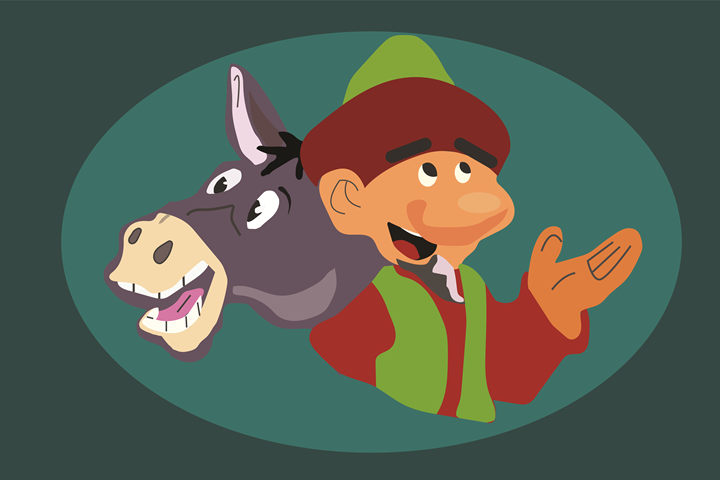The story of “Juha and the Donkey”


Juha and the Donkey is a beloved folktale in various cultures, particularly in the Middle East and parts of North Africa. Juha is a legendary figure known for wit, wisdom, and humorous anecdotes. His stories have been passed down through oral tradition for centuries and have been adapted and retold in numerous variations across different Arabic cultures. While the exact origin of the story is difficult to pinpoint, it likely emerged from the rich tapestry of oral storytelling traditions in the Middle East.
The origin story of Juha and his donkey is hard to pinpoint, but when you ask someone about Juha’s story, they will mostly tell you this one. It’s when Juha and his son embark on a journey, encountering criticism from villagers for their varying methods of traveling with their donkey. Striving to avoid judgment, they alternate riding and walking, but each adjustment prompts new criticism. But their attempts to please others lead them to sell the donkey altogether, highlighting the folly of trying to please everyone. Each tale holds a moral that teaches different ideas, and Arabs find them fascinating because narrators present them as satirical tales.
Nowadays, people use different tales of Juha as a teaching tool for kids, with many children’s channels narrating them using cartoons and catchy music for kids to enjoy. To carry on that folktale heritage to future generations, Arabs often use these stories to showcase the wisdom of their ancestors, ensuring its enduring presence. Another way Arabs use these tales nowadays is by quoting something related to one of Juha’s stories. Let’s see some examples of sayings used by Arabs relating to Juha’s stories:
مِسمارُ جُحا
/mismaaru juHaa/
Juha’s nail
Although there are many interpretations of this saying, most people agree that it describes someone who is nosy and makes weak excuses to get what they want. This saying comes from the amusing tale of Juha, known for his wit when an intriguing incident unfolds. Forced to sell his house, Juha cleverly requests that the buyer leave a single nail in the wall. Though seemingly innocent, this move hides a mischievous intent unknown to the buyer. Several days later, much to the buyer's surprise, Juha returns unannounced. Confused, the buyer asks Juha's reason for his visit, to which Juha, with a playful smirk, responds, "I've come to check on my nail."
The next commonly used saying is:
أَينَ أُذنُكَ يا جُحا؟
/ʼayna ʼuTHnuka yaa juHaa/
Where are your ears, Juha?
The saying is taken from Juha's behavior in one of his tales when someone asked him about his ear, so he gestured with his right hand above his head at his far-left ear, ignoring that his right ear was closer to him. This saying applies to a person who desires to take a path far from them, even though there is an easy path that will lead him to the same goal. The meaning changes depending on the situation; some people might intentionally or accidentally choose the longest and toughest path to achieve their goal. If they do it on purpose, it shows they're up for a challenge and don't mind facing obstacles. But if it's by accident, it just means they weren't paying attention or didn't know any better, which might seem silly.
The story of Juha and his donkey transcends generations, weaving its way through the cultural fabric of the Middle East and North Africa. Juha's wit and wisdom continue to captivate audiences with his humorous anecdotes, imparting valuable lessons. The origin of these stories still mystifies, and their enduring popularity attests to the timeless charm of Juha's adventures. Today, these tales hold essential components of our cultural heritage. They serve as educational resources for children and as sources of wisdom for adults. Through the lens of Juha's tales, we find insights into human behavior and the folly of trying to please everyone. As Arabs carry on the legacy of Juha's stories, they teach us to remember the enduring wisdom they offer and the laughter they bring to generations past, present, and future.
For more info about the Arabic culture and famous sayings, visit our website www.kaleela.com, or download the Kaleela app, available on both iOS App Store and Google Play.